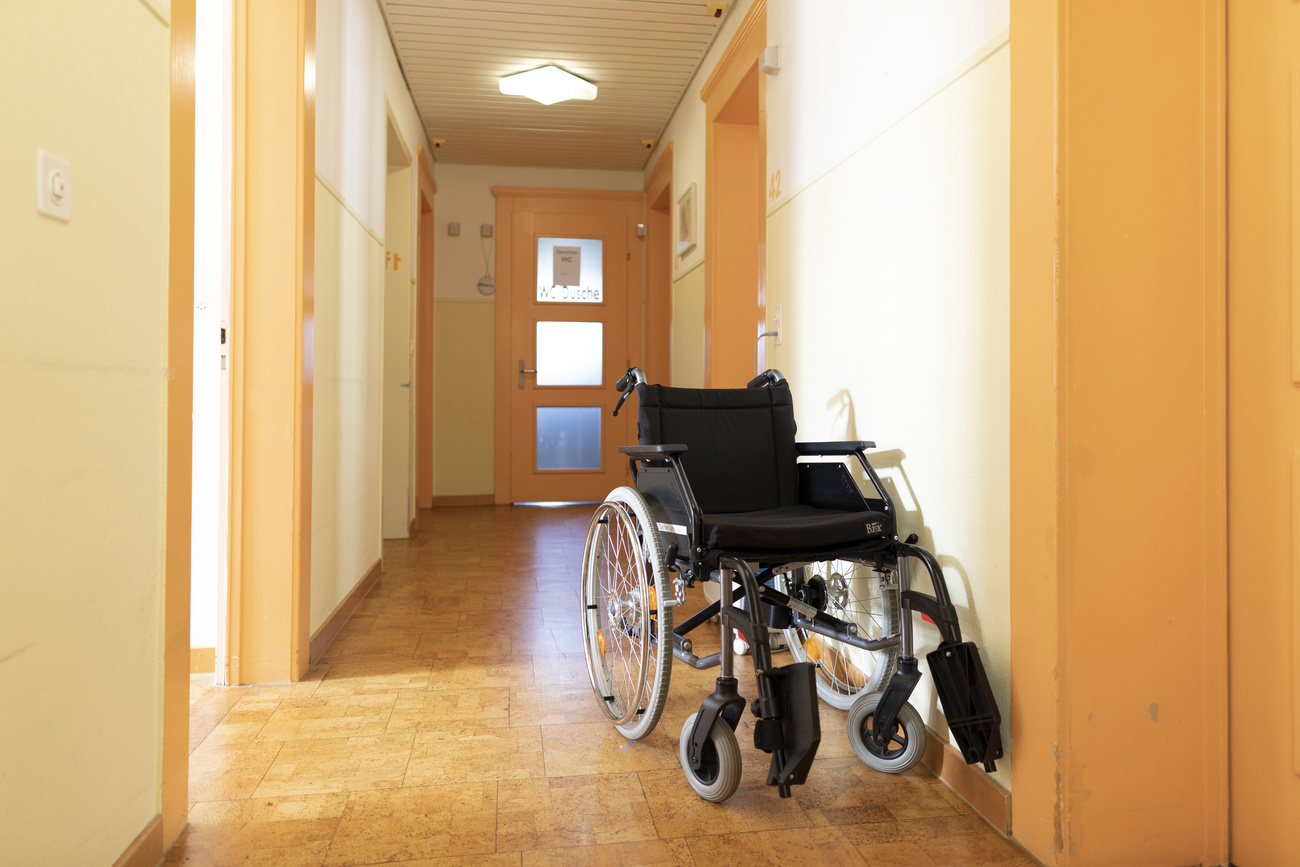Suicide assistants – who are they?

In Switzerland, helping people to commit suicide is a job. Employees of the largest assisted-suicide organisation, Exit, are often pensioners. They supply the fatal medication to patients who want to die. But their role is much more complex than that.
Jürg Billwiller is waiting for his train to Bern at Zurich main station. He is taking part in a training programme for Exit suicide assistants. Together with his mentor, Doris Wartenweiler, he will today help a patient to commit suicide. It’s his second assignment. “I’m nervous,” the sprightly pensioner admits.
A team from Swiss public television SRF accompanied Billwiller on his journey. Immediately after assisting the patient’s suicide, he told the film crew how it went.
More than 40 people are registered as suicide assistants with Exit. According to Jürg Wiler, the vice president of Exit, most of them are pensioners over 65. Billwiller has also now completed his training and is working as a suicide assistant.
Almost 1,000 people receive suicide assistance each year from Exit. Almost all of them (98% in 2019) choose to die either in their own homes or in the care home where they live.

More
Why assisted suicide is ‘normal’ in Switzerland
Suicide assistants like Billwiller bring the fatal dose of pentobarbital – always prescribed by a doctor – to the patient’s home. After the patient has self-administered the dose and died, the assistant remains for the police inspection.
But before that they have already looked after the patients on their final journey and helped them to prepare for the last day. They also take care of bereaved relatives and close friends who are present on the last day.
Suicide assistants must fulfil numerous conditions. If a candidate meets these requirements, he or she takes part in a one-year training programme to learn about the medical, legal and psychological aspects of assisted suicide and how to look after patients.

The basic requirements at Exit are “life experience, knowledge of people, and social and technical skills.” As a result, many suicide assistants have a background in social work or medicine. There are also some former priests and teachers.
The following conditions must be met:
– Knowledge and skills in psychology and communication
– Respect for the right to self-determination
– A stable personality with empathy and patience
– Knowledge of the legal context for assisted suicide
– Ideally aged 40 or over
The Exit suicide assistants are employed as contractors. For each case they handle, they receive CHF650 ($730). On top of that, they receive a basic allowance for expenses such as telephone calls and travel to the place of death. “As a rule, a suicide assistant devotes about 20 hours to each case. That works out as an hourly rate of 35 to 40 francs per hour, roughly equivalent to pay in nursing jobs,” Exit wrote in response to questions from SWI swissinfo.ch. It added that “it is not unusual for suicide assistants to remain in contact with a patient for years, which can mean dozens of hours of work.”
From preventer to helper
Jürg Billwiller was the head of the Zurich police prison for many years. After his retirement, he saw an Exit advertisement and applied.
As the head of a prison, his role was to stop inmates from committing suicide. Why is he now willing to help strangers to die? Billwiller says that these two situations cannot be compared. “Suicide in prison happens on impulse, because someone is under pressure,” Billwiller says in an interview with SRF. “People who decide to die with Exit are free of this pressure.”

Martin Krähenbühl, an experienced suicide assistant, began working in the field after his wife died of ALS (amyotrophic lateral sclerosis). His wife asked her doctor to prescribe a mixture of morphine and oxygen – a fatal combination that allowed her to die in peace.
In a 2018 interview with the newspaper SuedostschweizExternal link, the 64-year-old recounted how he “needed two to three years to digest this and to feel the ground under my feet again”. Then the desire started to grow to “help other people like my wife whose health situation is difficult.”

Increasing demand
The number of people who receive suicide assistance from Exit is growing. Krähenbühl took care of between 15 and 20 people wanting to die each year when he started. Five years later, it’s now about 30 people. As a result of rising demand, Exit is looking for new suicide assistants.
Jürg Wiler says that one reason for that is the age of the assistants. “Suicide assistants sometimes have to stop because of their age,” he says. “Moreover, we want to have the best networks of assistants possible in individual regions of Switzerland so that they are anchored in the region and they don’t need to travel too far.”
For foreigners
Dignitas, the second-biggest organisation for assisted suicide, also accepts foreigners who are not resident in Switzerland. Its training and assisted suicide process is almost the same as Exit’s. The big difference is that Dignitas employees deliver the fatal medication, not contractors. “11 of our 31 employees have this task on top of their normal office work,” says Silvan Luley, a member of the organisation.
People who come from abroad to die in Switzerland usually pass away in a Dignitas facility.
In contrast to the Netherlands, where assisted suicide takes place within the doctor-patient relationship, Switzerland has established a triangular system: A third party like Dignitas or Exit is involved in addition to the patient and doctor.
Dignitas spokesman Luley says one of the reasons for this is the history of assisted suicide in Switzerland. “In the 35 years since the first assisted suicide organisations were founded, assisted suicide has been carried out in a triangular structure. Doctors can directly support the suicide, but most doctors don’t have the time for it or the necessary expertise, so we deal with this part.”
Depressing work?
Susanna Schmid, a former lawyer specialised in juvenile affairs, became a suicide assistant after taking early retirement aged 60. “I am often asked if my work is depressing. I always answer that is very demanding rather than depressing.” In an Exit newsletter she explains. “I have to be very attentive to all those present. I spend longer dwelling on the very young people who have to leave ‘before their time’ because of grave illnesses, and sometimes leave behind adolescents or small children.”
Both Exit and Dignitas have an internal support system. According to Luley, suicide assistants at Dignitas can decide whether they want to take on specific cases. “It is possible to pass a case on to another employee,” he said.
Susanna Schmid said she can discuss difficult experiences with people close to her – or if necessary, with the head of suicide assistance at Exit. That helps, she said.

More
Suicide assistants – who are they?
Translated from German by Cathy Hickley, swissinfo.ch

In compliance with the JTI standards
More: SWI swissinfo.ch certified by the Journalism Trust Initiative











You can find an overview of ongoing debates with our journalists here . Please join us!
If you want to start a conversation about a topic raised in this article or want to report factual errors, email us at english@swissinfo.ch.